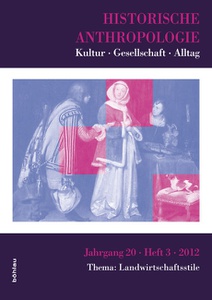Ernst Langthaler, Farming in Style. Historical-Anthropological Perspectives on Agrarian Structural Change as Practice
The ‘death of the peasantry’ through conversion into either farmers or labourers in the decades after the Second World War is a widely established topos in current historiography. However, this account underestimates the multitude of farm development pathways between the extremes of accumulation and proletarianization. By drawing on Jan Douwe van der Ploeg’s concept of farming styles, the article discusses theoretical and methodological tools suitable for exploring agrarian structural change as practice. Further, it assesses the empirical results of a research project using this toolkit in the light of current debates on agrarian transitions.
Ulrich Schwarz, Politicizing, Marketing, Adapting. Formations of the Agrarian Media Discourse in Der Österreichische Bauernbündler, 1950–1981
Productivism, promoted by state agencies, agricultural experts and farmers’ organizations, strongly influenced the debates about post-war development of Austrian agriculture. This article explores the media discourses through which this ‘expert system’ communicated its productivist conceptions within the farming population as expressed by a widely distributed farmers’ journal in Lower Austria. By applying geometric data analysis on the articles, different formations are outlined within a three-dimensional discursive space structured by (de‑)politicization, (de‑)commodification and (de-)autonomization. Further, the author identifies relations between different subject positions by which the journal’s readers are addressed.
Ernst Langthaler, Sophie Tod and Rita Garstenauer, Get Big, Get Out, Get On. Family Farming Agrosystems in Two Regions of Lower Austria, 1945–1985
The phrase ‘get big or get out’ not only characterized the rationale of agricultural policy
in the postwar Western world
, especially in the late 1960s and early 1970s, but also affected the historiographical image of ‘agrarian structural change’ after 1945. From a micro-historical perspective on a vast number of family farms in two Lower Austrian regions from the mid-1940s to the mid-1980s, this article aims to follow the actors along their paths during the ‘productivist transition’. A multi-level analysis reveals that between the extremes of farm expansion and abandonment, a multitude of development pathways emerged, thus highlighting strategies of how to get on with family farming in a challenging environment.
Rita Garstenauer, Ulrich Schwarz and Sophie Tod, Reconciling Everything. Peasant Styles of Farming in Two Regions of Lower Austria, 1945–1985
In this article, we discuss four case studies of peasant family farms based on narrative interviews. Situated in two different regions regarding ecological conditions and market infrastructure, these families faced different challenges, constraints and opportunities throughout the post-war period of structural change in agriculture. We distinguish four styles of farming according to their specific pattern of mobilising and allocating resources: labour-induced internal expansion, technology-induced external expansion, family orientated market superiority, and co-evolutionary growth.
Jan Douwe van der Ploeg, The Genesis and Further Unfolding of Farming Styles Research
This article summarizes the development of farming styles reserach in the Netherlands. It shows how these research results positively articulated with several new developments in Dutch agriculture. At the same time, though, these results also ran counter to the hegemonic views embodied in the Ministry of Agriculture, the Farmers Union and the Agricultural University. The article argues that the current agricultural crisis ceates, more than ever before, a need to reinvigorate inquiries into the heterogeneity of farming. The study of, and reflection on, differentiated development trajectories that were actively constructed during previous crises should be an integral part of such inquiries.
The issue can be ordered at the Böhlau-Verlag.
